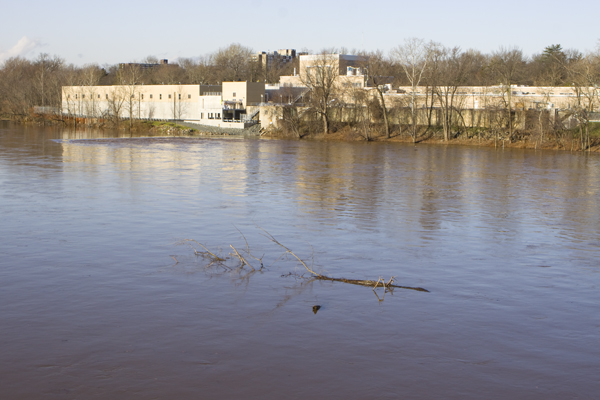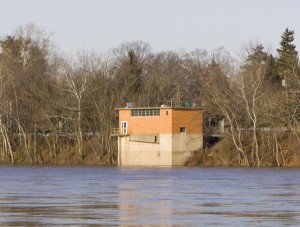Safe Drinking Water Jeopardized by Christie Moratorium

Trenton water filtration plant on Delaware River
Stalled Drinking Water Protections Opposed by Superfund Toxic Polluter and NJ Realtors
The Department of Environmental Protection (DEP) held a “informal stakeholders meeting” today to discuss three Safe Drinking Water program regulations frozen by Governor Christie’s Executive Orders.
We previously wrote about 1 of these rules, the drinking water standard (Maximum Contaminant Level (MCL)) for the chemical perchlorate (see: “Christie Rule Freeze Kills Drinking Water Standard for Chemcialc Found in Rocket Fuel & Explosives”
But in addition to the perchlorate MCL, the Christie freeze jeopardized NJ’s entire safe drinking water program. Because NJ has “primacy” under the federal Safe Drinking Water Act, the ill conceived Chrisite moratorium could force US EPA to intervene in NJ and take over implementation of the safe drinking water program, as well as withhold millions of dollars in federal funding support for NJ.
Background

Trenton's water supply intake on the Delaware River, just north of Trenton
NJ’s State drinking water law is far broader in scope and more stringent than the federal Safe Drinking Water Act. As a result, NJ has far lower and more protective standards for 14 chemicals, as well as tougher construction, monitoring, and enforcement programs. In addition, NJ’s Private Well Testing Act protects home buyers and sellers by requiring that private drinking water well sampling results and any exceedence of MCL’s be disclosed by the seller during real estate transactions. This disclosure leads to better protection and safer drinking water.
These rules should never have been targeted and listed in Executive Order #1.
NJ has a federally delegated and funded drinking water program based on NJ’s tougher laws that are designed to protect public health. Therefore, even though they were targeted, the 3 drinking water rules should have been exempt from the Christie moratorium under the terms of the Order.
Executive Order #1, which created the 90 day moratorium, a new cost benefit analysis test and federal consistency policy, and the “Red Tape Review” process, explicitly provides exemptions for rules that impact public health and/or delegated federal programs or federal funded programs. Under EO #1, the DEP Commissioner was directed to issue recommendations to the Lt. Governor 10 days after the Gov. signed the Order regarding any rules that met the public health, safety, welfare of federal exemption criteria.
Either Acting Commissioner Bob Martin failed to do so or the Lt. Governor over-rode his recommendation. But it is impossible to know what went on, as a result of the opaque process created by the Executive Orders.
Either possibility is bad news, because the perchlorate standard is likely to be killed, because it expires on March 16, just 24 hours after the close of the “re-opened” public comment period under the Executive Orders. But even if DEP were able to recommend adoption of the perchlorate MCL in less than 1 day to avoid the expiration, that still would expose the public comment period as a sham, because it is virtually impossible to read, evaluate and respond in writing to public comment in just one day (see: “DEP Creates Sham Process to Cover Defects in Christie Executive Orders“)
Today’s meeting
The meeting was well attended by water resource professionals, water purveyors, commercial laboratories, and environmental advocates.
DEP summarized the 3 rules and asked the following questions mandated by Executive Orders 1 and 2:
At the stakeholder meetings, the Department will be discussing the respective rule proposals in consideration of the topics outlined in Governor Christie’s Executive Orders 1, 2 and 3. Among the topics to be discussed are:
- Economic Analysis
- Effect of the proposed rules on New Jersey’s economy.
- Burdens on business and workers as compared with the intended benefits of the rules.
- Cost/benefit analysis performed by the Department as part of the proposal process, and scientific and economic research available from other jurisdictions relevant to the proposed rules.
- Federal Standards Comparison
- Do the proposed rules exceed Federal standards and if so, why?
- Process Improvement Evaluation
- How the proposed rules address processing time, extent of required submissions, and coordination with other programs and agency requirements.
- The public process used for the proposal as it relates to advance notice of rulemaking.
- The effect of the proposed rules on permits and applications for permits.
- The applicability of “waiver” provisions to the proposed rules.
- Compliance and Enforcement Evaluation:
The performance-based nature of the proposed rules
It is obvious that these biased questions are designed to reduce the stringency (i.e. level of public health protection provided) and compliance costs of the rules.
Garden State Labs spokesman Harvey Klein was strongly opposed to any further delay in adopting the rules, and said he was would be “astounded” if DEP failed to adopt the rules as proposed. He noted several examples of why NJ’s program should be maintained, including stricter standards for arsenic, and MTBE. He also noted that primacy provides flexibility and in some cases, lower costs due to not having to sample for chemicals not found in NJ that are targeted under the federal program for other states.
Water purveyors supported the rules, and noted the importance of public confidence in a safe water supply. They emphasized that other states modeled their drinking water programs on NJ’s and noted likely increased costs of any disruptive changed associated with delaying rule adoption.
Water companies also supported the re-adoption of the SDWA program rules. They supported the perchlorate MCL and noted that they could not recover any monitoring and treatment costs for perchlorate in water rates unless an MCL was adopted.
The labs and water purveyors opposed federal consistency, cost benefit analysis, and waivers created under the Executive Orders.
The environmental advocates supported adoption of all 3 rules without further delay.
The only technical debate of the day focused on the perchlorate standard. The minor technical concerns had been disused for years and nothing new emerged.
I asked those in the room that opposed the perchlorate standard to raise their hands.

lawyer representing toxic polluter ShieldAlloy Superfund site opposes perchlorate drinking water standard
The perchlorate standard was opposed by a NJ Realtors Assc. representative and a lawyer for a toxic polluter who created the federal Superfund site known as Shieldalloy.
EPA recently took over control of the Shield Alloy site based on an EPA Inspector General’s Report that found massive delays in cleanup due to DEP mismanagement and failure to enforce cleanup laws – see EPA REPORT BLASTS NEW JERSEY TOXIC CLEAN-UPS — State Failures to Enforce Law Lead to Worst Delays in the Country and FEDS PROCEED QUICKLY ON STALLED NEW JERSEY TOXIC CLEAN-UPS
The lawyer was seeking relief and weaker cleanup standards to reduce his cleanup costs and legal liability for damages caused by massive groundwater pollution. He engaged in a classic attempt to manufacture scientific uncertainty to delay and weaken regulations.
The real estate industry is worried that disclosing residential wells contaminated by perchlorate might slow down real estate deals (see this for a similar abuse by real estate interests).
But DEP found high rates of contamination in residential wells:
Private Well Testing Act rules
As noted above in this summary, sampling conducted by the Department revealed the presence of perchlorate in 10 of 21 counties in the State. Sampling of some private wells in Bergen County by the Department and sampling conducted by local health departments showed detection of perchlorate in 31 percent of the private water wells sampled. Concentrations of perchlorate in public wells have been detected as high as 253 μg/l, and concentrations in private wells in the northeastern portion of the State have been detected at levels greater than 100 μg/l. Based on the results of the sampling of public and private drinking water wells throughout the State, the Institute recommended and the Department has determined that perchlorate should be added to the list of compounds for which sampling is conducted under the Private Well Testing Act Regulations: (proposal at page 12)
So, there it is: commercial laboratories, drinking water companies, local water supply authorities, and environmental groups strongly support the rules.
They are opposed by a toxic polluter and the real estate industry.
Time for Governor Chrisite to choose side: public health protection, or toxic polluter and real estate protection.
Sound like a no brainer to me.
(Important end note: I will be submitting written comments urging DEP to move forward with regulating unregulated chemicals found in NJ waters, as well as adopting rules to implement the recommendations in a March 2009 Report by the Drinking Water Quality Institute to update and strengthen rules and regulate more toxic pollutants. We will write here on those topics in future).
Go Wolfe! Looking forward to reading your DEP comments if you publish them on chemicals in drinking water!